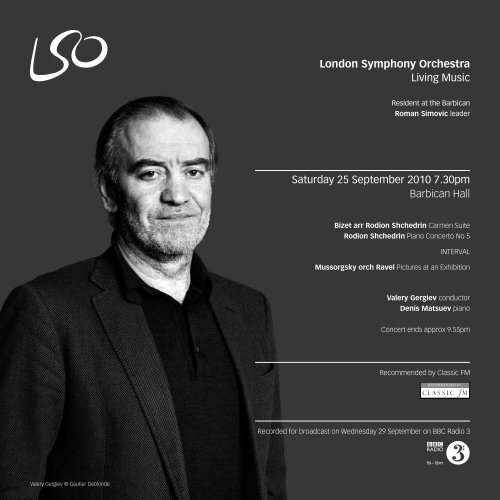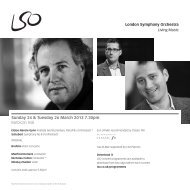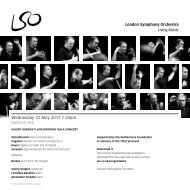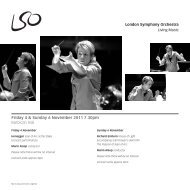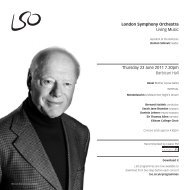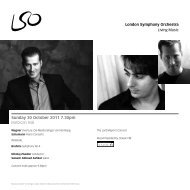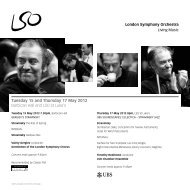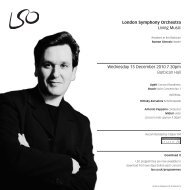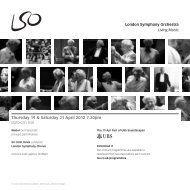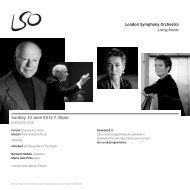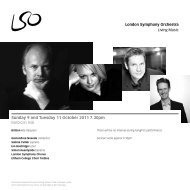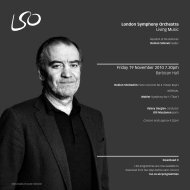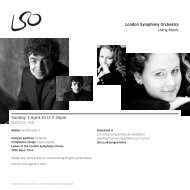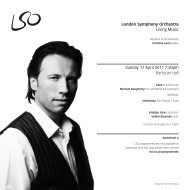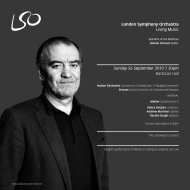25 September programme - London Symphony Orchestra
25 September programme - London Symphony Orchestra
25 September programme - London Symphony Orchestra
You also want an ePaper? Increase the reach of your titles
YUMPU automatically turns print PDFs into web optimized ePapers that Google loves.
Valery Gergiev © Gautier Deblonde<br />
<strong>London</strong> <strong>Symphony</strong> <strong>Orchestra</strong><br />
Living Music<br />
Resident at the Barbican<br />
Roman Simovic leader<br />
Saturday <strong>25</strong> <strong>September</strong> 2010 7.30pm<br />
Barbican Hall<br />
Bizet arr Rodion Shchedrin Carmen Suite<br />
Rodion Shchedrin Piano Concerto No 5<br />
INTERVAL<br />
Mussorgsky orch Ravel Pictures at an Exhibition<br />
Valery Gergiev conductor<br />
Denis Matsuev piano<br />
Concert ends approx 9.55pm<br />
Recommended by Classic FM<br />
Recorded for broadcast on Wednesday 29 <strong>September</strong> on BBC Radio 3
Welcome News<br />
A very warm welcome to the LSO’s opening concert of the 2010/11<br />
season, conducted by LSO Principal Conductor Valery Gergiev. We are<br />
delighted to be back at our Barbican home after a summer of highly<br />
successful concerts in the UK and abroad, including at the BBC Proms,<br />
in Aix-en-Provence and in Germany, and a major tour to China.<br />
Tonight’s concert begins with two works by the Russian composer<br />
Rodion Shchedrin: a composer much admired by Valery Gergiev and<br />
one whose music Gergiev has been eager to share with <strong>London</strong><br />
audiences for some time. We are delighted and honoured that<br />
Shchedrin is able to be with us in the audience tonight, and look<br />
forward to hearing more of his music later in the season.<br />
Tonight we also welcome our piano soloist Denis Matsuev, who will<br />
perform Shchedrin’s Piano Concerto No 5. This is Matsuev’s second<br />
visit to the LSO following his highly-acclaimed debut in March 2010.<br />
On behalf of everyone at the LSO I would like to extend my thanks<br />
to our media partners BBC Radio 3, who are recording this concert<br />
for broadcast on 29 <strong>September</strong>, and to Classic FM for their<br />
continued support.<br />
I hope you enjoy this evening’s performance and that you will be<br />
able to join us for many more concerts this season!<br />
Kathryn McDowell<br />
LSO Managing Director<br />
BBC Radio 3 Lunchtime Concerts at LSO St Luke’s<br />
A new series of chamber concerts begins at LSO St Luke’s this<br />
autumn, starting with solo recitals of Chopin piano music by Sergio<br />
Tiempo (30 Sep), Nicholas Angelich (7 Oct) and Benjamin Grosvenor<br />
(14 Oct). Later in the autumn we’ll welcome former BBC New<br />
Generation Artists the Pavel Haas Quartet, who will perform string<br />
quartets by Dvořák, Beethoven, Debussy, Ravel and Schubert.<br />
All concerts begin at 1pm. Call 020 7638 8891 to book (tickets £9),<br />
or book online.<br />
lso.co.uk/lunchtimeconcerts<br />
Musical events for everyone from LSO Discovery<br />
LSO Discovery have lots of events planned to kick off the autumn<br />
season. As well as the regular groups for all ages, from the Early<br />
Years Workshops to our Youth and Community choirs and our Digital<br />
Technology Group, there’s a chance to hear violinist Viktoria Mullova<br />
– the subject of our LSO Artist Portrait this season – in conversation<br />
at LSO St Luke’s on Friday 1 October. In discussion with LSO players,<br />
and illustrated by practical demonstrations, Viktoria will focus on her<br />
transition from Russian to Baroque repertoire. Or find out more<br />
about Czech composer Leoš Janáček at a Discovery Day on Sunday<br />
10 October, including access to an LSO rehearsal, a talk, chamber<br />
music and the chance to meet LSO players. For more ideas and<br />
information, visit<br />
lso.co.uk/getinvolved<br />
There's never been a better time to bring your friends to an<br />
LSO concert. Groups of 10+ receive a 20% discount on all tickets,<br />
plus a host of additional benefits. Call the dedicated Group Booking<br />
line on 020 7382 7211, visit lso.co.uk/groups, or email<br />
groups@barbican.org.uk.<br />
The LSO is delighted to welcome Classical Partners tonight.<br />
Bizet arr Rodion Shchedrin (b 1932)<br />
Carmen Suite (1967)<br />
Introduction<br />
Dance<br />
First Intermezzo<br />
Changing of the Guard<br />
Carmen’s Entrance and Habanera<br />
Scene<br />
Second Intermezzo<br />
Bolero<br />
Torero<br />
Torero and Carmen<br />
Adagio<br />
Fortune-telling<br />
Finale<br />
Ever since Oscar Hammerstein II and Richard Rodney Bennett<br />
collaborated on Carmen Jones in 1943, the idea of adapting Bizet’s<br />
opera to different media has been irresistibly attractive. In the world<br />
of ballet it started in 1949 with Roland Petit for Les Ballets de Paris,<br />
in a production that premiered in <strong>London</strong>. Seemingly unaware of<br />
that version, it had long been the dream of Shchedrin’s wife, the<br />
celebrated prima ballerina Maya Plisetskaya, to dance the title role.<br />
At one stage she even went to Shostakovich with the proposal,<br />
but despite their friendship he refused, on the grounds that it was<br />
impossible to compete with Bizet’s music. A similar response came<br />
from Aram Khachaturian, of Spartacus fame.<br />
Then in 1966 the Cuban National Ballet visited Moscow. Their<br />
passionate style worked on Plisetskaya, so she later said, like a snakebite.<br />
More calculatedly, she realised that a potential collaboration with<br />
virtually the only functioning communist regime in the West might<br />
conceivably gain approval from the Soviet powers-that-be, and she<br />
persuaded the Ministry of Culture to commission a Carmen ballet.<br />
Choreographer Alberto Alonso came up with a politically correct<br />
scenario, in which Carmen would be the victim of ‘a totalitarian<br />
system of universal slavery and submission’, and since time was<br />
short, Shchedrin produced a persiflage of Bizet rather than an<br />
original composition, with all sorts of additional colours and minor<br />
adjustments based on Alonso’s stipulations for drama and pacing.<br />
In the course of 20 days, four of which were spent in Hungary at<br />
the funeral of Zoltán Kodály, the composer ran up a score for strings<br />
and percussion that has since become a favourite in the concert<br />
hall. Plisetskaya herself would go on to dance the role some 350<br />
times, despite having to fight to reverse an official ban after the first<br />
performance (it seems that even as late as 1967 the Bolshoi Theatre<br />
and its political masters had problems with the spectacle of bare<br />
thighs and entwined legs).<br />
In addition to all the favourite tunes from the opera, the 13-movement<br />
Suite borrows two numbers from Bizet’s incidental music to<br />
L’Arlésienne and one from his opera La Jolie Fille de Perth. Shchedrin’s<br />
writing for percussion is the essential ingredient in his translation of<br />
the score, initially to comic-satirical effect, but with ever-increasing<br />
seriousness. If his model was, perhaps, the extraordinary percussion<br />
coda to the second movement of Shostakovich’s Fourth <strong>Symphony</strong><br />
– at that time recently rehabilitated in the Soviet Union – the debt<br />
would be handsomely repaid when Shostakovich composed his 14th<br />
<strong>Symphony</strong> two years later, scored for strings and percussion and with<br />
even a Carmen-ish ‘Malagueña’ as its second movement.<br />
The Introduction to Shchedrin’s Suite steals in as though in a<br />
dream, with tubular bells and col legno strings apparently sensing<br />
impending doom. Then a succession of numbers illustrates the wit<br />
and verve of the scoring, almost as if the composer is imagining a<br />
rebellious orchestra determined to subvert a rehearsal of the opera.<br />
Woodblocks, cowbells and bongos add their wry comments to<br />
‘Changing of the Guard’, insinuating an extra beat before allowing<br />
the music to play ‘straight’. And who could resist the sexy güiro or<br />
the sinuous vibraphone in the famous Habanera, or the sudden<br />
withholding of the theme in the Toreador’s movement?<br />
Already by this stage the hand of Fate has been sensed, and<br />
Bizet’s leitmotiv takes over in the Adagio, the movement whose<br />
choreography had most offended officialdom at the premiere.<br />
Shchedrin plays no tricks with the tragic dénouement, and the Suite<br />
ends as it began, except that, as we know, premonitions have now<br />
been fulfilled.<br />
2 Welcome & News Kathryn McDowell © Camilla Panufnik Programme Notes 3
Rodion Shchedrin (b 1932)<br />
Piano Concerto No 5 (1999)<br />
Allegretto moderato<br />
Andante<br />
Allegro assai<br />
Denis Matsuev piano<br />
Since Prokofiev and Shostakovich, the number of front-rank<br />
composers who could also claim to be first-rate concert pianists has<br />
dwindled remarkably, and of the remaining few, hardly any have made<br />
piano music as strong a feature of their output as Rodion Shchedrin.<br />
Trained as a composer under Yuri Shaporin and as a pianist under<br />
Yakov Flier, he has composed six piano concertos to date, as well as a<br />
substantial body of solo piano works.<br />
In this area Shchedrin has generally shown more affinity for Prokofiev<br />
than for Shostakovich, especially the concertos, which at least initially<br />
were marked by vivid colours, forceful energy and total absence of<br />
self-doubt. His First Piano Concerto, for instance, a graduation piece<br />
from 1954, was a cheerfully extrovert romp that could have been<br />
designed as a tribute to Prokofiev, who had died the previous year.<br />
Twelve years later, the Second Concerto retained that influence,<br />
alongside a playful indulgence in twelve-note techniques.<br />
However, nearly 20 years separate the first three piano concertos,<br />
all of which Shchedrin premiered and recorded with himself as soloist,<br />
from the last three (No 3 was composed in 1973, No 4 in 1991).<br />
In this second phase, exhibitionism gives way to a more private,<br />
exploratory tone.<br />
The Fifth Piano Concerto was composed in 1999 for Finnish pianistcomposer<br />
Olli Mustonen, who gave the premiere in October that<br />
year with the Los Angeles Philharmonic <strong>Orchestra</strong> under Esa-Pekka<br />
Salonen. Indeed the first movement seems initially designed to<br />
showcase Mustonen’s trademark pecking staccato touch, which is set<br />
off firstly against slow, singing lines, then against attractively scored<br />
scalic flourishes. The extended central section is slightly slower as<br />
well as weightier in tone, and it eventually inspires a more songful<br />
transformation of the opening material. This lengthy movement closes<br />
with a brief return of textures from the first section.<br />
4 Programme Notes<br />
The slow movement opens with an austere orchestral chorale, which<br />
the piano immediately takes up in a short cadenza. Ghosts of the first<br />
movement pass across the stage, but the main musical character<br />
seems to focus on four-note descending figures, highly malleable<br />
but almost always song-like.<br />
In essence a perpetuum mobile, the finale deliberately emulates<br />
the ‘crescendo with music’ of Ravel’s Bolero. For long stretches this<br />
movement demands greater virtuosity from the orchestra than the<br />
soloist, at least in terms of rhythmical precision. Finally the soloist cuts<br />
loose in a cadenza worthy of Shostakovich for its manic leaps, and<br />
when the orchestra rejoins it is with a Prokofievian style mécanique in<br />
overdrive, concluding the work with its most physically exciting pages.<br />
Shchedrin <strong>programme</strong> notes and profile © David Fanning<br />
David Fanning is a professor of music at the University of Manchester.<br />
He is an expert on Shostakovich, Nielsen and Soviet music. He is also<br />
a reviewer for the Daily Telegraph, Gramophone and BBC Radio 3.<br />
INTERVAL: 20 minutes<br />
I still today continue to be convinced that<br />
the decisive factor for each composition is<br />
intuition. As soon as composers relinquish<br />
their trust in this intuition and rely in its<br />
place on musical ‘religions’ such as serialism,<br />
aleatoric composition, minimalism or<br />
other methods, things become problematic.<br />
Rodion Shchedrin<br />
Rodion Shchedrin (b 1932)<br />
The Man<br />
The generation of Soviet composers after Shostakovich produced<br />
charismatic and exotic figures such as Galina Ustvolskaya,<br />
Alfred Schnittke and Sofiya Gubaydulina, whose music was initially<br />
controversial but then gained cult status. At the other end of the<br />
stylistic spectrum it featured highly gifted craftsmen such as<br />
Boris Tishchenko, Boris Tchaikovsky and Mieczysław Weinberg, all<br />
of whom worked more or less within the parameters laid down by<br />
Shostakovich and were highly respected in their heyday but gradually<br />
fell from favour.<br />
Somewhere in between we can locate Rodion Shchedrin – an<br />
individualist with a broader and more consistent appeal, who could<br />
turn himself chameleon-like to virtuoso pranks or to profound<br />
philosophical reflection, to Socialist Realist opera or to folkloristic<br />
Concertos for <strong>Orchestra</strong> (a particular speciality), to technically solid<br />
Preludes and Fugues, to jazz, and, when he chose, even to twelvenote<br />
constructivism.<br />
Trained at the Moscow Conservatoire in the 1950s, as a composer<br />
under Yuri Shaporin and as a pianist under Yakov Flier in the early<br />
years of the Post-Stalinist Thaw, Shchedrin was one of<br />
the first to speak out against the constraints of<br />
musical life in the Soviet Union. He went on to play<br />
a significant administrative role in the country’s<br />
musical life, heading the Russian Union of Composers<br />
from 1973 to 1990. Married since 1958 to the star<br />
Soviet ballerina Maya Plisetskaya, he established a<br />
significant power-base from which he was able to promote<br />
not only his own music but also that of others – such as<br />
Schnittke, whose notorious First <strong>Symphony</strong> received its<br />
sensational premiere only thanks to Shchedrin’s support.<br />
An unashamed eclectic, and suspicious of dogma from<br />
either the arch-modernist or arch-traditionalist wings of<br />
Soviet music, Shchedrin occupied a not always comfortable<br />
position, both in his pronouncements and in his creative<br />
work. With one foot in the national-traditional camp and the<br />
other in that of the internationalist-progressives, he was<br />
tagged with the unkind but not unfair label of the USSR’s<br />
Rodion Shchedrin © www.lebrecht.co.uk<br />
‘official modernist’. From 1992 he established a second home in<br />
Munich, but he still enjoyed official favour in post-Soviet Russia,<br />
adding steadily to his already impressive roster of prizes.<br />
Shchedrin has summed up his artistic credo as follows: ‘I continue to<br />
be convinced that the decisive factor for each composition is intuition.<br />
As soon as composers relinquish their trust in this intuition and rely in<br />
its place on musical ‘religions’ such as serialism, aleatoric composition,<br />
minimalism or other methods, things become problematic.’<br />
Programme Notes<br />
5
Rodion Shchedrin & Valery Gergiev<br />
Russian Compatriots<br />
Rodion Shchedrin<br />
Valery Gergiev<br />
16 Dec 1932<br />
Born, Moscow<br />
6 Programme Notes<br />
1945–50<br />
Joined the<br />
Moscow<br />
Choral School<br />
1950–55<br />
Trained at<br />
the Moscow<br />
Conservatory<br />
1958<br />
Married<br />
ballerina Maya<br />
Plisetskaya<br />
2 May 1953<br />
Born, Moscow<br />
Valery Gergiev’s Rodion Shchedrin<br />
1960<br />
The Little<br />
Humpbacked<br />
Horse, Moscow<br />
1961<br />
Not only love,<br />
Moscow<br />
1963<br />
Naughty Limericks,<br />
Warsaw<br />
Fri 19 Nov 2010 Piano Concerto No 4 (‘Sharp Keys’) with Olli Mustonen<br />
Wed 23 & Thu 24 Mar 2011 Lithuanian Saga<br />
1964–69<br />
Professor of Composition,<br />
Moscow Conservatory<br />
1967<br />
Carmen Suite,<br />
Moscow<br />
1968<br />
The Chimes,<br />
New York<br />
1969<br />
Becomes freelance<br />
composer<br />
1968<br />
Refused to sign open<br />
letter sanctioning the<br />
invasion of Warsaw Pact<br />
troops in Czechoslovakia<br />
1972<br />
Anna Karenina,<br />
Moscow<br />
1973<br />
Succeeds Shostakovich<br />
as President of the Union<br />
of Composers of the<br />
Russian Federation<br />
1972<br />
Receives the USSR<br />
State Prize<br />
1960 1970 1980 1990 2000<br />
1972–77<br />
Trained at the Leningrad<br />
Conservatory<br />
1977<br />
Dead Souls,<br />
Moscow<br />
1976<br />
Wins Herbert von Karajan<br />
Conducting Competition,<br />
Berlin<br />
1977<br />
Appointed Assistant<br />
Conductor to Kirov<br />
Opera<br />
1978<br />
Kirov debut<br />
– War and<br />
Peace<br />
1981–85<br />
Appointed Chief<br />
Conductor of the<br />
Armenian Philharmonic<br />
<strong>Orchestra</strong><br />
1989<br />
Khorovody,<br />
Tokyo<br />
1985<br />
Honorary member of the<br />
International Music Council<br />
1983<br />
Honorary member of the<br />
Academy of Fine Arts, GDR<br />
1984<br />
Receives the Lenin Prize<br />
1985<br />
UK debut at the<br />
Lichfield Festival<br />
1988<br />
The Sealed<br />
Angel,<br />
Moscow<br />
1988<br />
LSO debut<br />
1989<br />
Member of Berlin<br />
Arts Academy<br />
1988<br />
Appointed Chief<br />
Conductor and<br />
Artistic Director<br />
of the Mariinsky<br />
Theatre<br />
1990<br />
Old Russian Circus<br />
Music, Chicago<br />
1991<br />
USA debut with<br />
War and Peace<br />
1994<br />
Lolita, Stockholm;<br />
Sotto voce Concerto,<br />
<strong>London</strong>;<br />
Trumpet Concerto,<br />
Pittsburgh<br />
1993<br />
Receives Dmitri<br />
Shostakovich Prize<br />
1998<br />
Four Russian Songs,<br />
<strong>London</strong><br />
1997<br />
Honorary Professor,<br />
Moscow Conservatory<br />
1997<br />
Receives Dmitri<br />
Shostakovich Prize<br />
1998<br />
Fifth Piano Concerto,<br />
Los Angeles<br />
1999<br />
Marries Natalya Debisova<br />
1995–2008<br />
Appointed Principal Conductor<br />
of the Rotterdam Philharmonic<br />
<strong>Orchestra</strong><br />
1996<br />
Russian government appoints<br />
him overall Director of the<br />
Mariinsky Theatre<br />
1997<br />
Appointed Principal Guest<br />
Conductor of the Metropolitan<br />
Opera, New York<br />
2002<br />
Dialogues with<br />
Shostakovich,<br />
Pittsburgh<br />
2003<br />
Sixth Piano Concerto,<br />
Amsterdam<br />
2002<br />
Order for Service to<br />
the Russian State:<br />
Third Degree<br />
2005<br />
2008<br />
Honorary Professor, Honorary Professor,<br />
St Petersburg State Central Conservatory<br />
Conservatory of Music, Beijing<br />
2003<br />
UNESCO Artist for Peace<br />
2003<br />
Order for Service to the<br />
Russian State: Third Degree<br />
2003<br />
First performance<br />
of Wagner’s Ring in<br />
Russia for 90 years<br />
2006<br />
Boyarina Morozova,<br />
Moscow<br />
2007<br />
Order for Service to<br />
the Russian State:<br />
Fourth Degree<br />
2006<br />
Opens the new<br />
Mariinsky Concert<br />
Hall<br />
2008<br />
Order for Service to<br />
the Russian State:<br />
Fourth Degree<br />
2004<br />
2007<br />
Second appearance Takes Mariinsky<br />
with the LSO Wagner’s Ring to<br />
New York<br />
2005<br />
Appointed 15th Principal<br />
Conductor of the LSO<br />
(first official concert<br />
23 Jan 07)<br />
2010<br />
Named one of the 100 Most<br />
Influential People in the World<br />
by Time magazine<br />
Programme Notes<br />
7
Modest Mussorgsky (1839–81) orch Maurice Ravel (1875–1937)<br />
Pictures at an Exhibition (1874 orch 1922)<br />
Promenade<br />
1 Gnomus<br />
Promenade<br />
2 Il vecchio castello<br />
Promenade<br />
3 Tuileries (Dispute d’enfants après jeux)<br />
4 Bydło<br />
Promenade<br />
5 Ballet of the Unhatched Chicks<br />
6 Samuel Goldenberg and Schmuÿle<br />
7 Limoges: Le marché (La grande nouvelle) –<br />
8 Catacombae (Sepulchrum romanum) –<br />
Cum mortuis in lingua morta<br />
9 The Hut on Hen’s Legs (Baba Yaga) –<br />
10 The Great Gate of Kiev<br />
Victor Hartmann’s promising career as an architect, painter, illustrator<br />
and designer was cut short by his death at the age of 39 in 1873.<br />
In February 1874 there was a memorial exhibition of his work in<br />
St Petersburg, and this was the stimulus for Mussorgsky to compose<br />
his piano suite Pictures at an Exhibition to the memory of his dead friend.<br />
The Hartmann exhibition contained 400 items. Only a quarter of them<br />
have survived, and of these only six relate directly to Mussorgsky’s<br />
music. Among the lost works are the inspirations behind Gnomus,<br />
Bydło, Tuileries, Il vecchio castello and Limoges. This hardly matters,<br />
though, because Mussorgsky’s imagination goes far beyond the<br />
immediate visual stimulus. It tells us little about the music to learn that<br />
the half-sinister, half-poignant Gnomus was inspired by a design for a<br />
nutcracker (you put the nuts in the gnome’s mouth), or that Baba Yaga<br />
was a harmless and fussy design for a clock, hard to connect with<br />
Mussorgsky’s powerful witch music. Goldenberg and Schmuÿle are<br />
actually two separate drawings, and the dialogue between them is an<br />
invention of the composer’s.<br />
Mussorgsky, a song composer of genius, could sum up a character,<br />
mood or scene in brief, striking musical images, and this is what he<br />
does in Pictures. The human voice is never far away: Bydło, a picture<br />
of a lumbering ox-cart, and Il vecchio castello (The Old Castle) could<br />
well be songs; some of the Promenades and The Great Gate of Kiev<br />
suggest the choral tableaux in his operas; in Goldenberg and Schmuÿle,<br />
the differences between the rich Jew and the poor Jew are suggested<br />
by their different ‘speech patterns’; in Tuileries we hear the cries of<br />
children playing and in Limoges the squabbling of market-women.<br />
Pictures might have been just a loose collection of pieces, but<br />
Mussorgsky in fact devised something far more complex and<br />
interesting. The Promenade that links the pictures is on one level a<br />
framing device, representing the composer (or perhaps the listener)<br />
walking around the exhibition. Sometimes he passes directly from one<br />
picture to another, without reflection. Sometimes he is lost in thought.<br />
On one occasion, he seems to be distracted by seeing something out<br />
of the corner of his eye (the false start to the Ballet of the Unhatched<br />
Chicks), and turns to look more closely. Cum mortuis is not itself a<br />
picture, but represents the composer’s reflections on mortality after<br />
seeing the drawing of Hartmann and two other figures surrounded<br />
by piles of skulls in the Paris catacombs. The composer is also drawn<br />
personally into the final picture as the Promenade emerges grandly<br />
from the texture of The Great Gate of Kiev.<br />
Although Mussorgsky must have played Pictures to his friends, there<br />
is no record of any public performance until well into the 20th century.<br />
It was indeed only after the success of Ravel’s orchestration that<br />
performances of the piano version became at all common. The piano<br />
writing of Pictures is often said to be unidiomatic, and Mussorgsky<br />
certainly never cared for conventional beauty of sound or pianistic<br />
virtuosity for its own sake. There are certainly aspects of the texture<br />
that are hard to bring off successfully, such as the heavy chordal style<br />
of some Promenades, Bydło and The Great Gate of Kiev; the tricky<br />
repeated notes in Goldenberg and Schmuÿle and Limoges; and the<br />
sustained tremolos in Cum mortuis and Baba Yaga. But these are all<br />
part of Mussorgsky’s desired effect.<br />
Pictures at an Exhibition has been subjected to many arrangements<br />
(including one by Proms founder-conductor Henry Wood), but none<br />
so brilliant as Ravel’s, which was commissioned by the Russian<br />
conductor Serge Koussevitzky, and first performed by him in Paris<br />
on 19 October 1922. Ravel was<br />
already a great enthusiast for<br />
the music of Mussorgsky. He had<br />
collaborated with Stravinsky on<br />
orchestrating parts of his opera<br />
Khovanshchina for Diaghilev’s<br />
Paris performances in 1913, and<br />
far preferred Mussorgsky’s barer<br />
original score of Boris Godunov<br />
to the more colourful edition by<br />
Rimsky-Korsakov. With Pictures<br />
there are only three major<br />
The Great Gate of Kiev differences between Ravel’s<br />
Victor Hartmann<br />
orchestration and the piano<br />
original, which he knew only<br />
from Rimsky’s 1886 edition: the omission of a Promenade between<br />
Goldenberg and Schmuÿle and Limoges; the addition of some extra<br />
bars in the finale; and the dynamics of Bydło, which Mussorgsky<br />
marked to begin loudly, not with a slow crescendo.<br />
Ravel’s orchestral colours and techniques are far more elaborate<br />
than anything that Mussorgsky might ever have conceived, so his<br />
work must be considered more a free interpretation than a simple<br />
transcription. Some of his choices of instrumentation for solo<br />
passages are unforgettable: the opening trumpet, for example, or<br />
the alto saxophone in Il vecchio castello and the tuba in Bydło.<br />
Even more remarkable is the range of colour that Ravel achieves, and<br />
the way in which the essence of the music is faithfully reproduced<br />
while the original piano textures are presented in an altogether<br />
different sound medium. Ravel and Mussorgsky could hardly have<br />
been more different as men and as composers, but Pictures at an<br />
Exhibition has justly become famous as a collaboration between two<br />
great creative minds.<br />
Programme note © Andrew Huth<br />
Andrew Huth is a musician, writer and translator who writes<br />
extensively on French, Russian and Eastern European music.<br />
Modest Mussorgsky (1839–81)<br />
Composer Profile<br />
Modest Mussorgsky was born in Karevo, the youngest son of a<br />
wealthy landowner. His mother gave him his first piano lessons, and<br />
his musical talent was encouraged at the Cadet School of the Guards<br />
in St Petersburg, where he began to compose (despite having no<br />
technical training) – in 1856, the year that he entered the Guards, he<br />
attempted an opera. In 1857 he met Balakirev, whom he persuaded<br />
to teach him, and shortly afterwards began composing in earnest.<br />
The following year Mussorgsky suffered an emotional crisis and<br />
resigned his army commission, but returned soon afterwards to<br />
his studies. He was, however, plagued by nervous tension, and this,<br />
combined with a crisis at the family home after the emancipation of<br />
the serfs in 1861, stalled his development quite severely. By 1863,<br />
though, he was finding his true voice, and he began to write an opera<br />
(never completed) based on Flaubert’s Salammbô. At this time he<br />
was working as a civil servant and living in a commune with five<br />
other young men passionate about art and philosophy, where he<br />
established his artistic ideals.<br />
In 1865 his mother died; this probably caused his first bout of<br />
alcoholism. His first major work, Night on Bare Mountain, was<br />
composed in 1867, and soon afterwards, fired by the ideas discussed<br />
in Balakirev’s circle (‘The Mighty Handful’) he began writing his opera<br />
Boris Godunov; a little later he also began work on another opera,<br />
Khovanshchina. Heavy drinking was once again affecting his creativity,<br />
though he did write the piano work Pictures at an Exhibition in a<br />
short time. By 1880 he was obliged to leave government employment,<br />
and despite the support of his friends, he lapsed still further,<br />
eventually being hospitalised in February 1881 after a bout of<br />
alcoholic epilepsy. It was during a brief respite that Repin painted his<br />
famous portrait of the composer, but within two weeks of that work,<br />
Mussorgsky died.<br />
Profile © Alison Bullock<br />
Alison Bullock is a freelance writer and music consultant whose<br />
interests range from Machaut to Messiaen and beyond. She is a<br />
former editor for the New Grove Dictionary of Music and the LSO.<br />
8 Programme Notes Programme Notes 9
Valery Gergiev<br />
Conductor<br />
Body<br />
Principal Conductor of the <strong>London</strong> <strong>Symphony</strong><br />
<strong>Orchestra</strong> since January 2007, Valery Gergiev<br />
performs regularly with the LSO at the<br />
Barbican, at the Proms and at the Edinburgh<br />
Festival, as well as regular tours of Europe,<br />
North America and Asia. During the 2010/11<br />
season he will lead them in appearances in<br />
Germany, France, Switzerland, Japan and<br />
the USA.<br />
Valery Gergiev is Artistic and General<br />
Director of the Mariinsky Theatre, founder<br />
and Artistic Director of the Stars of the<br />
White Nights Festival and New Horizons<br />
Festival in St Petersburg, the Moscow Easter<br />
Festival, the Gergiev Rotterdam Festival, the<br />
Mikkeli International Festival, and the Red<br />
Sea Festival in Eilat, Israel. He succeeded<br />
Sir Georg Solti as conductor of the World<br />
<strong>Orchestra</strong> for Peace in 1998 and leads them<br />
this season in concerts in Abu Dhabi.<br />
His inspired leadership of the Mariinsky<br />
Theatre since 1988 has taken the Mariinsky<br />
ensembles to 45 countries and has brought<br />
universal acclaim to this legendary institution,<br />
now in its 227th season. Having opened a<br />
new concert hall in St Petersburg in 2006,<br />
Maestro Gergiev looks forward to the opening<br />
of the new Mariinsky Opera House in the<br />
summer of 2012.<br />
Born in Moscow, Valery Gergiev studied<br />
conducting with Ilya Musin at the Leningrad<br />
Conservatory. Aged 24 he won the Herbert<br />
von Karajan Conductors’ Competition in<br />
Berlin and made his Mariinsky Opera debut<br />
one year later in 1978 conducting Prokofiev’s<br />
War and Peace. In 2003 he led St Petersburg’s<br />
300th anniversary celebrations, and opened<br />
the Carnegie Hall season with the Mariinsky<br />
<strong>Orchestra</strong>, the first Russian conductor to do<br />
so since Tchaikovsky conducted the Hall’s<br />
inaugural concert in 1891.<br />
Now a regular figure in all the world’s major<br />
concert halls, he will lead the LSO and<br />
the Mariinsky <strong>Orchestra</strong> in a symphonic<br />
Centennial Mahler Cycle in New York in the<br />
2010/11 season. He has led several cycles in<br />
New York including Shostakovich, Stravinsky,<br />
Prokofiev, Berlioz and Richard Wagner’s Ring.<br />
He has also introduced audiences to several<br />
rarely-performed Russian operas.<br />
Valery Gergiev’s many awards include a<br />
Grammy, the Dmitri Shostakovich Award,<br />
the Golden Mask Award, People’s Artist of<br />
Russia Award, the World Economic Forum’s<br />
Crystal Award, Sweden’s Polar Music Prize,<br />
Netherlands’s Knight of the Order of the Dutch<br />
Lion, Japan’s Order of the Rising Sun, Valencia’s<br />
Silver Medal, the Herbert von Karajan prize and<br />
France’s Royal Order of the Legion of Honour.<br />
He has recorded exclusively for Decca<br />
(Universal Classics), and appears also on<br />
the Philips and Deutsche Grammophon<br />
labels. Currently recording for LSO Live, his<br />
releases include Mahler Symphonies Nos<br />
1, 2, 3, 4, 6, 7 and 8, Rachmaninov <strong>Symphony</strong><br />
No 2, Prokofiev Romeo and Juliet and Bartók<br />
Bluebeard’s Castle.<br />
His recordings on the newly formed Mariinsky<br />
Label are Shostakovich The Nose and<br />
Symphonies Nos 1, 2, 11 & 15, Tchaikovsky’s<br />
1812 Overture, Rachmaninov Piano Concerto<br />
No 3 and Rhapsody on a Theme of Paganini,<br />
Shchedrin The Enchanted Wanderer,<br />
Stravinsky Les Noces and Oedipus Rex,<br />
many of which have won awards including<br />
four Grammy nominations. The most recent<br />
release is Wagner Parsifal (<strong>September</strong> 2010),<br />
featuring René Pape and Gary Lehman.<br />
Valery Gergiev conducts<br />
Fri 19 Nov 7.30pm<br />
Rodion Shchedrin Piano Concerto No 4<br />
(‘Sharp Keys’) with Olli Mustonen piano<br />
Mahler <strong>Symphony</strong> No 1 (‘Titan’)<br />
Tue 18 & Sun 23 Jan 7.30pm<br />
Shostakovich Violin Concerto No 2<br />
with Sergey Khachatryan violin<br />
Tchaikovsky <strong>Symphony</strong> No 1 (‘Winter<br />
Daydreams’)<br />
Wed 2 & Thu 3 Mar 7.30pm<br />
Mahler <strong>Symphony</strong> No 9<br />
Tickets from £8<br />
lso.co.uk (£1.50 bkg fee per transaction)<br />
020 7638 8891 (£2.50 bkg fee per transaction)<br />
Denis Matsuev<br />
Piano<br />
Denis Matsuev has become a fast-rising<br />
star on the international concert stage<br />
since his triumphant victory at the Eleventh<br />
International Tchaikovsky Competition in<br />
Moscow in 1998, and has quickly established<br />
himself as one of the most sought-after<br />
pianists of his generation.<br />
Matsuev has collaborated with the world’s<br />
best known orchestras, such as the<br />
New York Philharmonic, Chicago <strong>Symphony</strong>,<br />
Berlin Philharmonic <strong>Orchestra</strong>, <strong>London</strong><br />
<strong>Symphony</strong> <strong>Orchestra</strong>, <strong>London</strong> Philharmonic,<br />
Leipzig Gewandhaus <strong>Orchestra</strong>, Bavarian<br />
Radio <strong>Symphony</strong>, National <strong>Symphony</strong>,<br />
Pittsburgh <strong>Symphony</strong>, Cincinnati <strong>Symphony</strong>,<br />
WDR <strong>Symphony</strong> Cologne, BBC <strong>Symphony</strong>,<br />
Philharmonia <strong>Orchestra</strong>, Royal Scottish<br />
National <strong>Orchestra</strong>, Filarmonica della Scala,<br />
Orchestre National de France, Orchestre<br />
de Paris, Orchestre Philharmonique de<br />
Radio France, Orchestre National du<br />
Capitole de Toulouse, Budapest Festival<br />
<strong>Orchestra</strong>, Rotterdam Philharmonic, and<br />
the European Chamber <strong>Orchestra</strong>; he is<br />
continually engaged with the legendary<br />
Russian orchestras such as the St Petersburg<br />
Philharmonic, the Mariinsky <strong>Orchestra</strong> and<br />
the Russian National <strong>Orchestra</strong>.<br />
Denis Matsuev’s worldwide festival<br />
appearances include Leipzig’s Mendelssohn<br />
and Schumann Festival, the Chopin Festival<br />
in Poland, Maggio Musicale Fiorentino and<br />
the Mito Festival, both in Italy, Les Chorégies<br />
d’Orange in France, Verbier Festival in<br />
Switzerland, Enescu Festival in Romania and<br />
the Ravinia Festival in the USA.<br />
In the 2010/11 season, Denis Matsuev will<br />
appear under the batons of Valery Gergiev,<br />
Paavo Järvi (Orchestre de Paris and Frankfurt<br />
Radio <strong>Symphony</strong> <strong>Orchestra</strong>), Kurt Masur<br />
(Orchestre National de France), Zubin Mehta<br />
(<strong>Orchestra</strong> del Maggio Musicale Florentino),<br />
Mikhail Pletnev (Philharmonia <strong>Orchestra</strong>,<br />
Russian National <strong>Orchestra</strong>), Vladimir<br />
Spivakov (National Philharmonic <strong>Orchestra</strong><br />
of Russia in France and Russia), and Yuri<br />
Temirkanov (Philharmonia <strong>Orchestra</strong>, and<br />
St Petersburg Philharmonic in Taiwan,<br />
Shanghai, Beijing and Hong Kong).<br />
In 2011 he will also return to the Pittsburgh<br />
<strong>Symphony</strong> with Gianandrea Noseda, and<br />
will undertake a North American recital<br />
tour including Boston, Washington, Toronto,<br />
Montreal, Vancouver and San Francisco.<br />
In December 2007, Sony BMG released a CD<br />
of Matsuev: Unknown Rachmaninoff, and<br />
garnered strong positive reviews praising<br />
his execution and creativity. His Carnegie<br />
Hall debut recital in 2007 was recorded live<br />
by Sony BMG: Denis Matsuev – Concert<br />
at Carnegie Hall. In December 2009, the<br />
new Mariinsky Label released Matsuev’s<br />
Rachmaninov Concerto No 3, with Valery<br />
Gergiev and the Mariinsky <strong>Orchestra</strong>,<br />
recorded in the Mariinsky Concert Hall in<br />
St Petersburg.<br />
Over the past four years, Denis Matsuev has<br />
collaborated with the Sergei Rachmaninov<br />
Foundation and its President, Alexander<br />
Rachmaninov, the grandson of the composer.<br />
He was chosen by the Foundation to perform<br />
and record unknown pieces by Rachmaninov<br />
on the composer’s own piano at the<br />
Rachmaninov house in Lucerne. In October<br />
2008, at the personal invitation of Alexander<br />
Rachmaninov, Denis Matsuev was named<br />
Artistic Director of the Sergei Rachmaninov<br />
Foundation. As part of this partnership, he<br />
will perform in a series of gala concerts in<br />
some of the most prestigious concert halls<br />
throughout Europe and the United States.<br />
Denis Matsuev is Artistic Director of two<br />
Russian festivals: Stars on Baikal in Irkutsk,<br />
Siberia, and Crescendo, a series of events<br />
held in many different international cities<br />
including Moscow, St Petersburg, Tel-Aviv,<br />
Paris and New York. These remarkable<br />
festivals present a new generation of<br />
students from Russia’s music schools<br />
by featuring gifted Russian soloists from<br />
around the world performing with the best<br />
Russian orchestras. Additionally, Matsuev<br />
is the President of the charitable Russian<br />
foundation New Names.<br />
10 The Artists Valery Gergiev © Gautier Deblonde<br />
Denis Matsuev © Andrey Mustafaev<br />
The Artists 11
On stage tonight<br />
First Violins<br />
Roman Simovic Leader<br />
Carmine Lauri<br />
Lennox Mackenzie<br />
Nicholas Wright<br />
Nigel Broadbent<br />
Ginette Decuyper<br />
Jörg Hammann<br />
Michael Humphrey<br />
Maxine Kwok-Adams<br />
Claire Parfitt<br />
Laurent Quenelle<br />
Colin Renwick<br />
Sylvain Vasseur<br />
Alain Petitclerc<br />
Hazel Mulligan<br />
Helen Paterson<br />
Second Violins<br />
David Alberman<br />
Thomas Norris<br />
Sarah Quinn<br />
Miya Ichinose<br />
Richard Blayden<br />
Belinda McFarlane<br />
Iwona Muszynska<br />
Philip Nolte<br />
Paul Robson<br />
Stephen Rowlinson<br />
David Worswick<br />
Caroline Frenkel<br />
Roisin Walters<br />
Oriana Kriszten<br />
Violas<br />
Paul Silverthorne<br />
Gillianne Haddow<br />
German Clavijo<br />
Lander Echevarria<br />
Richard Holttum<br />
Robert Turner<br />
Heather Wallington<br />
Jonathan Welch<br />
Martin Schaefer<br />
Michelle Bruil<br />
Caroline O’Neill<br />
Fiona Opie<br />
12 The <strong>Orchestra</strong><br />
Cellos<br />
Rebecca Gilliver<br />
Alastair Blayden<br />
Jennifer Brown<br />
Mary Bergin<br />
Noel Bradshaw<br />
Daniel Gardner<br />
Hilary Jones<br />
Minat Lyons<br />
Amanda Truelove<br />
Penny Driver<br />
Double Basses<br />
Rinat Ibragimov<br />
Colin Paris<br />
Nicholas Worters<br />
Patrick Laurence<br />
Matthew Gibson<br />
Thomas Goodman<br />
Jani Pensola<br />
Nikita Naumov<br />
Flutes<br />
Gareth Davies<br />
Adam Walker<br />
Siobhan Grealy<br />
Piccolo<br />
Sharon Williams<br />
Oboes<br />
Emanuel Abbühl<br />
Joseph Sanders<br />
Fraser MacAulay<br />
Cor Anglais<br />
Christine Pendrill<br />
Clarinets<br />
Andrew Marriner<br />
Chris Richards<br />
Chi-Yu Mo<br />
Bass Clarinet<br />
Lorenzo Iosco<br />
Bassoons<br />
Rachel Gough<br />
Bernardo Verde<br />
Joost Bosdijk<br />
Contra Bassoon<br />
Dominic Morgan<br />
Horns<br />
Timothy Jones<br />
David Pyatt<br />
Angela Barnes<br />
Estefanía Beceiro Vázquez<br />
Jonathan Lipton<br />
Trumpets<br />
Philip Cobb<br />
Nicholas Betts<br />
Gerald Ruddock<br />
Nigel Gomm<br />
Trombones<br />
Dudley Bright<br />
Katy Jones<br />
James Maynard<br />
Bass Trombone<br />
Paul Milner<br />
Tuba<br />
Patrick Harrild<br />
Timpani<br />
Antoine Bedewi<br />
Percussion<br />
Neil Percy<br />
David Jackson<br />
Scott Bywater<br />
Helen Edordu<br />
Tom Edwards<br />
Sacha Johnson<br />
Harps<br />
Bryn Lewis<br />
Karen Vaughan<br />
Celeste/Piano<br />
John Alley<br />
LSO String<br />
Experience Scheme<br />
Established in 1992, the<br />
LSO String Experience<br />
Scheme enables young string<br />
players at the start of their<br />
professional careers to gain<br />
work experience by playing in<br />
rehearsals and concerts with<br />
the LSO. The scheme auditions<br />
students from the <strong>London</strong><br />
music conservatoires, and 20<br />
students per year are selected<br />
to participate. The musicians<br />
are treated as professional<br />
’extra’ players (additional to<br />
LSO members) and receive<br />
fees for their work in line with<br />
LSO section players. Students<br />
of wind, brass or percussion<br />
instruments who are in their<br />
final year or on a postgraduate<br />
course at one of the <strong>London</strong><br />
conservatoires can also<br />
benefit from training with LSO<br />
musicians in a similar scheme.<br />
The LSO String Experience<br />
Scheme is generously<br />
supported by the Musicians<br />
Benevolent Fund and Charles<br />
and Pascale Clark.<br />
Leslie Boulin Raulet (first violin),<br />
Yan Beattie (viola) and Damian<br />
Rubido González (double bass)<br />
are all playing in tonight’s<br />
concert as part of the LSO<br />
String Experience Scheme.<br />
List correct at time of<br />
going to press<br />
See page xv for <strong>London</strong><br />
<strong>Symphony</strong> <strong>Orchestra</strong> members<br />
Editor<br />
Edward Appleyard<br />
edward.appleyard@lso.co.uk<br />
Print<br />
Cantate 020 7622 3401<br />
Advertising<br />
Cabbell Ltd 020 8971 8450


